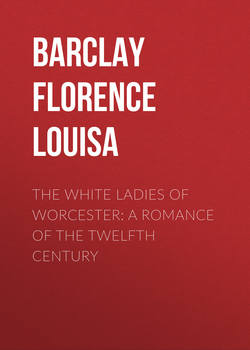Читать книгу The White Ladies of Worcester: A Romance of the Twelfth Century - Barclay Florence Louisa - Страница 13
CHAPTER XIII
"SEND HER TO ME!"
ОглавлениеThe Prioress stood for a moment outside the closed door. The peaceful silence of the passage helped her to the outward calm which must be hers before she could bring herself to face her nuns.
Moving slowly to the farther end, she unlocked the cell of Sister Mary Seraphine, feeling a shamed humility that she should have made so sure she had to deal with "Wilfred," and have thought such scorn of him and Seraphine. Alas! The wrong deeds of those they love, oft humble the purest, noblest spirits into the soiling dust.
Next, the Prioress herself rang the Refectory bell.
The hour for the evening meal was long passed; the nuns hastened out, readily.
As they trooped toward the stairs leading down to the Refectory, they saw their Prioress, very pale, very erect, standing with her back to the door of her chamber.
Each nun made a genuflexion as she passed; and to each, the Prioress slightly inclined her head.
To Sister Mary Rebecca, who kneeled at once, she spoke: "I come not to the meal this evening. In the absence of Mother Sub-Prioress, you will take my place."
"Yes, Reverend Mother," said Sister Mary Rebecca, meekly, and kissed the hem of the robe of the Prioress; then rising, hastened on, charmed to have a position of authority, however temporary.
When all had passed, the Prioress went into the cloisters, walked round them; looked over into the garden, observing every possible place from which prying eyes might have sight of the way from the passage to the crypt entrance. But the garden, already full of purple shadows, was left to the circling swifts. The robin sang an evening song from the bough, of the pieman's tree.
The Prioress returned along the passage, looking into every cell. Each door stood open wide; each cell was empty. The sick nuns were on a further passage, round the corner, beyond the Refectory stairs. Yet she passed along this also, making sure that the door of each occupied cell was shut.
Standing motionless at the top of the Refectory steps, she could hear the distant clatter of platters, the shuffling feet of the lay-sisters as they carried the dishes to and from the kitchens; and, above it all, the monotonous voice of Sister Mary Rebecca reading aloud to the nuns while they supped.
Then the Prioress took down one of the crypt lanterns and lighted it.
* * * * * *
Meanwhile the Knight, left alone, stood for a few moments, as if stunned.
He had played for a big stake and lost; yet he felt more unnerved by the unexpected finality of his own acquiescence in defeat, than by the firm refusal which had brought that defeat about.
It seemed to him, as he now stood alone, that suddenly he had realised the extraordinary detachment wrought by years of cloistered life. Aflame with love and longing he had come, seeking the Living among the Dead. It would have been less bitter to have knelt beside her tomb, knowing the heart forever still had, to the last, beat true with love for him; knowing the dead arms, lying cold and stiff, had he come sooner, would have been flung around him; knowing the lips, now silent in death, living, would have called to him in tenderest greeting.
But this cold travesty of the radiant woman he had left, said: "Touch me not," and bade him seek a wife elsewhere; he, who had remained faithful to her, even when he had thought her faithless.
And yet, cold though she was, in her saintly aloofness, she was still the woman he loved. Moreover she still had the noble carriage, the rich womanly beauty, the look of vital, physical vigour, which marked her out as meant by Nature to be the mother of brave sons and fair daughters. Yet he must leave her—to this!
He looked round the room, noted the low archway leading to the sleeping chamber, took a step toward it, then fell back as from a sanctuary; marked the great table, covered with missals, parchments, and vellum. It might well have been the cell of a learned monk, rather than the chamber of the woman he loved. His eye, travelling round, fell upon the Madonna and Child.
In the pure evening light there was a strangely arresting quality about the marble group; something infinitely human in the brooding tenderness of the Mother, as she bent over the smiling Babe. It spoke of home, rather than of the cloister. It struck a chord in the heart of the Knight, a chord which rang clear and true, above the jangle of disputation and bitterness.
He put out his hand and touched the little foot of the Holy Babe.
"Mother of God," he said aloud, "send her to me! Take pity on a hungry heart, a lonely home, a desolate hearth. Send her to me!"
Then he lifted from the floor the white robe and hood, and drew them on.
